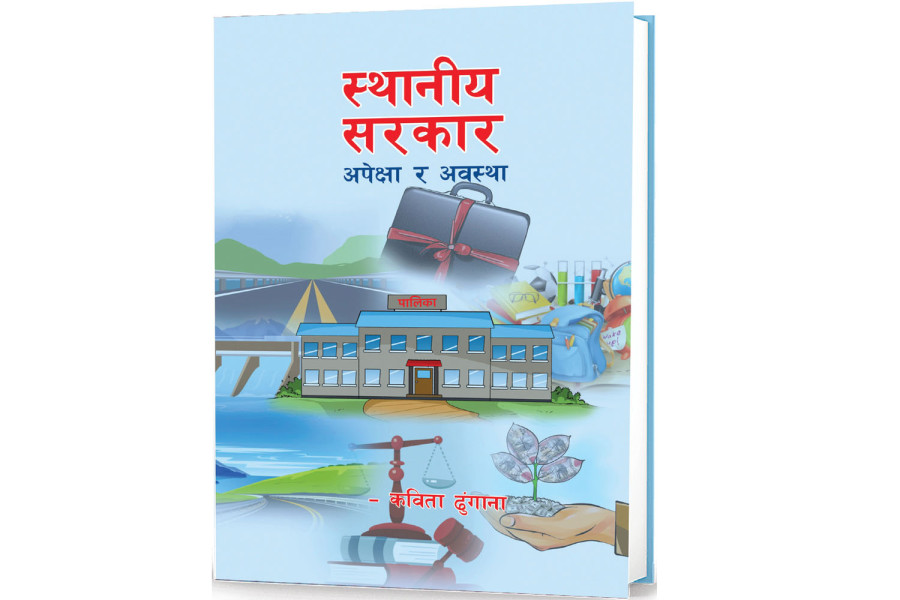Culture & Lifestyle
Examining the challenges of local governments in Nepal
Kabita Dhungana explores the transition to federalism with insights into its theoretical, political and practical aspects in her book ‘Sthaniya Sarkar: Apeksha ra Awastha’.
Khim Lal Devkota
Nepal, the world’s newest federal nation, transitioned from a unitary system to a federal democratic republic in 2015 with the introduction of a new constitution. This reform established three levels of governance: federal, provincial and local, distributing state power among them. The governance structure assigns more spending responsibilities to provincial and local levels, while the federal government retains most revenue-raising rights. Intergovernmental fiscal transfers aim to align functional responsibilities with revenue-raising rights.
Despite a local governance history spanning over a century—the official records only beginfrom the 1947 Kathmandu election—it was the 2015 constitution that granted constitutional empowerment to the local level. The constitution clearly defines their authority, outlining exclusive and concurrent functions at the local levels. It emphasises their political, fiscal and administrative autonomy, recognising them as integral to Nepal’s federalism. The Constitution details their powers, aligning with federalism, inclusivity and non-hierarchical relationships among government levels.
Primarily, local levels are responsible for delivering essential services, supported by detailed descriptions in the 2017 Local Government Operation Act. Additionally, they hold certain judicial functions. Elections occur every five years, ensuring at least one-third representation for women, as per the constitution. The local elections took place in May-September 2017 and then again in May 2022, marking a five-year cycle.
Nepal’s constitution guarantees proportional, inclusive, and participatory representation across all government bodies, including local governments (LGs). In the 2017 LG elections, 40.96 percent of representatives were women, a figure that slightly increased to 41.22 percent in the 2022 election. This reflects the commitment to ‘representation within LGs as outlined in the constitution.
In this context, Kabita Dhungana, elected the deputy mayor of Belkotgadhi Municipality in Nuwakot district during the 2017 local elections, has recently released a book titled ‘Sthaniya Sarkar: Apeksha ra Awastha’ (Local Government: Conditions and Expectations). This analytical work delves into her experiences in leadership within the municipality. Published in August 2023 by Khoji Publishing House, the author extensively discusses various dimensions of LGs, including federalism.
This 240-page book, accompanied by pictures, is divided into three sections. The first section discusses the theoretical and political aspects of local government (LG) formation, constitutional rights and structure of LGs, budget-making processes, local curriculum, experiences as a deputy mayor and childhood experiences.
The second section focuses on the fiscal rights and conditions of LGs, the significance of LGs and their impact on communities, overall experiences of working as a deputy mayor, lessons learned, suggestions, and recommendations. Finally, the last section includes images to portray the role of deputy mayors.
This book contributes significantly to understanding the theoretical, political, policy and practical aspects of federalism and its application at the local level. It emphasises the crucial role of maintaining alignment between government structures and public expectations.
The author, holding a master’s degree in commerce and politics alongside a law degree, is only 34 years old. This book serves as a valuable reference for strengthening the federal system and guiding local representatives. With over two decades of advocating for the rights of subnational levels, including LGs, I encourage every LG representative to document their experiences, be it in books or other forms, showcasing their achievements. And this book can be a guiding resource for them.
Many elected representatives at the local level share similar educational backgrounds with the author and are under 40 years old, making this book particularly beneficial for them. However, it’s equally important to stress the significance of sharing knowledge and wisdom from all individuals, fostering a collective exchange of insights.
According to the constitution, LGs have the right to exercise state power, including judicial functions. It’s a source of pride for Nepal’s LGs to assign the responsibility of the judicial committee to the deputy mayor/vice-chairs, selecting someone capable, akin to the author, Dhungana, who has experienced life’s trials and triumphs from an early age. The book is enriched with a concise overview of a resolved complaint during the tenure as the judicial committee's coordinator.
Looking back on the five-year term of LGs, there was often discord between chiefs and deputy chiefs in many instances. Many deputy chiefs expressed dissatisfaction with the limited responsibilities delegated by the chiefs. Some instances occurred where officials from the same party had minimal communication, merely issuing commands to the chief without dialogue. However, this wasn't a universal experience. The book highlights the importance of defining a distinct role—deputy chiefs should assert themselves. The law grants deputy chiefs substantial rights, suggesting that by adhering strictly to legal protocols, grievances can be avoided. This is the main message conveyed in the book.
The ten-year Maoist insurgency resulted in the loss of thousands of lives. In 2008, the Madhes movement took place, bringing about change in the country. The constitution ensures proportional, participatory representation as per the spirit of various political movements. The federal democratic republican governance system, rooted in the sacrifices of martyrs during these movements has been established. In this context, the author’s father, Bharat Dhungana, former president of the District Development Committee of Nuwakot, was also killed during the Maoist movement. Hundreds of martyrs like him have played a significant role in the country’s current transformation.
The country’s various movements empowered people with sovereignty. Women and Madhesi individuals have taken on leadership roles, such as the presidency and vice presidency of the country. The constitution mandates a minimum of one-third female representation at every level and sector of the state.
It is our collective responsibility to focus on strengthening this federal governance system. Thanks to the constitution, many women, like Dhungana, have succeeded in becoming deputy mayors/chairs of LGs. Experiences from their initial tenure at LGs have shown that, given the opportunity, women can effectively manage not only LGs but also the country.
Concerning LGs, political parties tend to limit women to the position of deputy chiefs. This mindset needs to change. This concern is also highlighted in the book.
The report of the ‘Federalism Implementation Study and Monitoring Parliamentary Special Committee’ of the National Assembly, which I chaired, recommended a gender-balanced constitutional system similar to that of the Speaker and Deputy Speaker of the House of Representatives. The report advocates for its implementation at the LGs level. Furthermore, legal and policy adjustments are suggested to increase the number of women candidates in the elections for the House of Representatives and the Provincial Assembly, expanding their representation beyond just the proportional electoral system.
The constitution has granted LGs 22 exclusive and 15 concurrent rights. Unfortunately, these rights haven’t been effectively utilised. The main reason for LGs not meeting expectations is the absence of proper civil service, education and other essential laws. The shortage of employees is a significant issue at the LGs. If resolved, the local level could thrive in various aspects, such as politics, society, economy, geography, culture, and tourism, among others, within a short span. Following the subsidiarity principle—similar to how a strong root fortifies a tree—developing and prospering at the local level could uplift the entirety of Nepal.
The author has done an incredible job by documenting the knowledge, experiences, and teachings she acquired through her duties into a comprehensive work accessible to all readers.
Devkota is an expert in federalism and local governments.




 16.88°C Kathmandu
16.88°C Kathmandu















